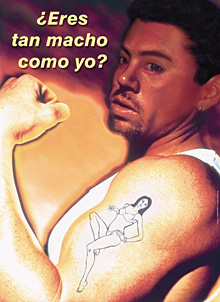 |
 |
 |
 Editorials | Issues | April 2007 Editorials | Issues | April 2007  
Mexico Embracing Liberal Agenda
 Chris Hawley - arizonarepublic.com Chris Hawley - arizonarepublic.com


| | Abortion, gay rights gain fans in land of machismo. |
Whatever happened to macho, conservative, religious Mexico?

From gay marriage to abortion, Mexicans are taking some dramatic steps to the left of the political spectrum lately, infuriating the Roman Catholic Church and challenging old stereotypes about their country.

Part of the change is due to Mexico's burgeoning democracy, as leftist lawmakers revel in their new freedom to defy conservative President Felipe Calderón. Part of it is due to the rapid growth of Mexican cities and the fading of rural traditions.

"We are seeing a new readiness to challenge old customs in this country," said Carlos Lugo Galera, a social-sciences professor at Iberoamerican University in Mexico City. "The simple fact that we're examining these issues is important."

Sociologists are divided over how widespread the changes are, because much of the action is concentrated in Mexico City, the most cosmopolitan place in the country. But nationwide, liberal political parties have made gains, and polls indicate young Mexicans are increasingly ignoring Catholic strictures.

"Here in Mexico we've always been very machista and very oriented toward customs . . . but it seems like we're changing," said Alejandro Hernández Ramos, a 23-year-old grocery-store employee in Ajalpan.

On March 16, Mexico City began performing civil unions for same-sex couples, giving them most of the rights of marriage. City leaders attended the first ceremonies, ran newspaper ads publicizing the civil unions, and even hired mariachi bands to serenade the couples. There were almost no protests.

The northern state of Coahuila began performing same-sex unions on Jan. 31. In February, a lesbian couple from Texas became the first foreigners to be united there.

Mexico City also recently began allowing conjugal visits for homosexual prisoners. And in February, Mexico's Supreme Court ruled that HIV-positive soldiers cannot be expelled from the military.

Now, liberal political parties in Mexico are challenging another conservative pillar: Mexico's ban on abortion. The Mexican Congress is debating bills that would allow abortion in federally funded hospitals. The Mexico City legislature, which is dominated by the left-leaning Democratic Revolutionary Party, will vote April 12 on a law allowing abortions within the city limits.

A poll by the conservative Reforma newspaper indicated 59 percent of Mexico City residents would favor a law allowing abortion up to 14 weeks into a pregnancy. The Vatican is so concerned that it sent its top anti-abortion campaigner, Colombian Cardinal Alfonso Lopez Trujillo, to lead protests against the federal and local bills.

Neither gay rights nor abortion are new in Mexico.

In the Indian towns of southern Mexico, homosexuals are accepted as a normal part of society, said Victor Manuel Durand, an expert on Mexico's political culture.

Abortions, meanwhile, have been practiced illegally in Mexico for decades. One government study estimated that 102,000 clandestine abortions were performed in 1997. Rich Mexicans have them done secretly in private clinics or fly to the United States, where abortion is legal.

"Abortion has always been an option for people who have money," said Alvaro Arreola Ayala, a sociologist and author. "They go to New York, they go to Houston, they go to San Diego and have abortions with no problem."

Society less macho

Still, open discussion of such issues would have been unthinkable not long ago in Mexico. This is a country where shrines to the Virgin of Guadalupe pepper street corners and where 96 percent of people say they consider themselves Catholic.

Experts say it's a sign that Mexican society is slowly becoming more secular and less macho.

Women make up 22 percent of the Mexican Congress, compared with 17 percent in the United States. Use of birth control, which is condemned by the Catholic Church, is widespread and has lowered the Mexican fertility rate to 2.1 children per woman, nearly the same as in the United States.

In Mexico City's Zona Rosa gay district, couples kiss and hold hands in public. Mexican pop culture has been challenging social mores, as well. More than 950,000 Mexicans went to see Brokeback Mountain, according to Nielsen EDI, which tracks ticket sales. When Christian Chávez of the Mexican pop group RBD came out of the closet in March, fans rallied around him.

Meanwhile, the influence of the Catholic Church is dwindling. About 73 percent of Mexicans ages 12-29 say religious beliefs have no influence on their attitudes toward social problems, according to a 2000 poll by the Mexican Institute on Youth.

Seventy-five percent said religion has no role in their beliefs about sexuality.

Political changes

Politicians are showing a willingness to tackle these issues, encouraged by a new openness in government after seven decades under the control of the authoritarian Institutional Revolutionary Party, or PRI.

"This is a society that is becoming more accustomed to the uses of democracy, and one of the uses is the right to free expression and debate," said Yolanda Meyenberg, a researcher at the Institute of Social Investigation at the National Autonomous University of Mexico.

The PRI, was born from the chaos following the 1910-20 Mexican Revolution. Though it claimed to be center-left, the PRI's main objective was ensuring stability in Mexico.

The party's power has been shrinking since election reforms in the 1990s. The July 2 elections showed voters are almost evenly divided between the conservative National Action Party, or PAN, of President Felipe Calderón and the liberal Democratic Revolutionary Party, or PRD.

Both sides are challenging Mexico's sacred cows, Lugo Galera said: The PAN wants to dismantle government-run monopolies and welfare systems, while the PRD wants progress on gay rights and abortion.

"What we are seeing now is a true battle between the interests and the powers of these parties," Lugo Galera said.

Reach the reporter at chris.hawley@arizonarepublic.com. | 
 | |
 |



